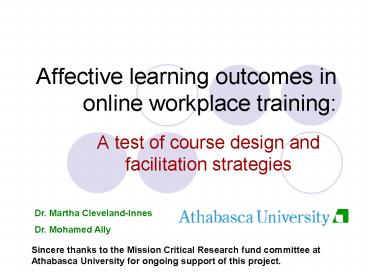Affective learning outcomes in online workplace training: - PowerPoint PPT Presentation
1 / 21
Title:
Affective learning outcomes in online workplace training:
Description:
A test of course design and facilitation strategies. Dr. Martha Cleveland-Innes. Dr. Mohamed Ally ... Constructed a short course as the instructional treatment ... – PowerPoint PPT presentation
Number of Views:45
Avg rating:3.0/5.0
Title: Affective learning outcomes in online workplace training:
1
Affective learning outcomes in online
workplace training
- A test of course design and facilitation
strategies
Dr. Martha Cleveland-Innes Dr. Mohamed Ally
Sincere thanks to the Mission Critical Research
fund committee at Athabasca University for
ongoing support of this project.
2
Presentation overview
- Introduction and context
- Affective outcomes in online environments
- Online instructional design for affective
outcomes - Preliminary results
- The need for socialization and community to
foster human skill development - Discussion
3
Emphasis on cognitive outcomes ..
- To succeed in the Knowledge Age .. not only will
we be expected to handle more knowledge faster
and to greater effect, but the very nature of the
knowledge experience will change. - Transforming e-Knowledge A Revolution in the
Sharing of Knowledge. Norris, Mason, and Lefrere
(2003)
4
What may be left behind ..
- . there is little evidence of the wherewithal
and effectiveness of online education in the
generation of affective outcomes - Clark, D. (2005). Softskills and E-learning..
5
What are affective learning outcomes?
- individual disposition, willingness,
preferences, enjoyments ... (Gronlund, 2000, p.
57) - the external expression of internalized emotion
through attitudes and values (Krathwohl, Bloom
Masia, 1964 Gagne, Briggs Wagner, 1992).
6
Fostering affective outcomes online
- Written communication in an online context
provides for a systematic approach to
constructing meaning, particularly in difficult
and ill-defined content areas (Garrison, 2002,
p. 10).
7
The experiment
- Constructed a short course as the instructional
treatment - Used random assignment to place participants in
one of two online learning platforms - Online platforms varied according to type of
interaction
8
WebCT Meeting Customer Needs in Online Service
Environments
- Content support
- Text, audio, video material
- Asynchronous threaded discussion
- Synchronous chat
- Group work
- Learner presentations
- 24-7
9
ElluminateLive - Meeting Customer Needs in Online
Service Environments
- Synchronous online presentation
- Audio interaction/synchronous text chat
- Group work/application sharing
- Collaborative
- One hour per week
10
Facilitating affective outcomes
- Emotional and psychological safety
- Self-awareness
- Self-reflection
- Demonstration of new/appropriate models
- Application opportunity
- Interaction opportunity
11
Differences in delivery
- ElluminateLive attendance highly variable and
access to content challenging - Enthusiasm for the tool very high
- WebCT increased engagement and opportunity for
self study - Range of scores was
- much higher for WebCT
- higher variability in experience
12
Preliminary results self assessment
- Average difference in pre post self-assessment
of soft skills - WebCT N56 ElluminateLive N45
- 4.25 3.9
13
Preliminary results exam scores
- Final exam class averages
- WebCT N56 ElluminateLive N45
- 87.8 81.3
14
This course met my expectations ..
- WebCT ElluminateLive
- 15 36
15
Am satisfied with what I learned .l.
- WebCT ElluminateLive
- 25 54
16
Would recommend course ..
- WebCT ElluminateLive
- 50 73
17
Content of the course relevant ..
- WebCT ElluminateLive
- 40 72
18
Content was interesting ..,
- WebCT ElluminateLive
- 26 73
19
Assessing affect
- Relationship exists between cognition and affect
- Final exam tested content knowledge, responses
and application - Affect as an internal event self-assessment as
accessing personal evaluation of those events
20
Online instruction for affect
- High touch environment
- Reference group
- Self-awareness exercises
- Reflection on practice
- Practice requirements
- Application exercises
- High interaction
21
Affective learning outcomes in online
workplace training
Sincere thanks to the Mission Critical Research
fund committee at Athabasca University for
ongoing support of this project.
- A test of course design and facilitation
strategies
Dr. Martha Cleveland-Innes Dr. Mohamed
Ally martic_at_athabascau.ca
mohameda_at_athabascau.ca































